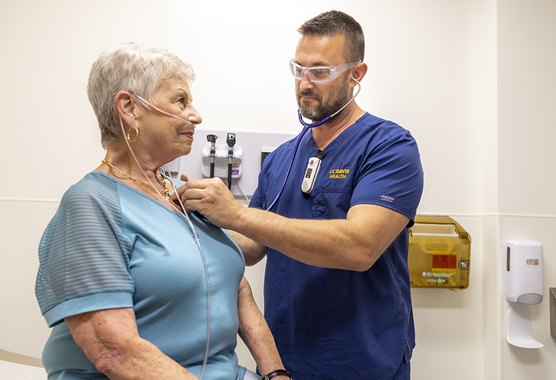Pneumonia
When your lungs aren’t working right and you’re having trouble breathing, you need expert care. At UC Davis Health, your health care team works quickly to help you breathe.
Medically reviewed by Dean Blumberg, M.D. on Aug. 18, 2023.

What Is Pneumonia?
Pneumonia is an infection that causes inflammation in the air sacs (alveoli) within your lungs. The alveoli fill with fluid or pus. Pneumonia can affect one lung or both of your lungs.
In the Division of Infectious Diseases, we provide compassionate care for patients with pneumonia. We use the latest research and therapies to prevent, diagnose and treat this condition.
Types of Pneumonia
Types of pneumonia vary depending on how you got it:
- Aspiration pneumonia: When you inhale food, liquid, saliva or vomit into your windpipe (trachea) and down into your lungs.
- Community-acquired pneumonia (CAP): When you get pneumonia outside of a hospital. This is the most common type of pneumonia.
- Healthcare-associated pneumonia (HCAP): When you get pneumonia in a long-term care facility (nursing home) or an outpatient clinic, such as a kidney dialysis center.
- Hospital-acquired pneumonia (HAP): When you get pneumonia in a hospital or other healthcare facility during treatment for another health condition.
- Ventilator-associated pneumonia (VAP): When you get pneumonia after using a machine to help you breathe (ventilator).
Symptoms of Pneumonia
Pneumonia symptoms can range from mild to severe, depending on your age, other health conditions and the type of germ that caused pneumonia.
Common Symptoms of Pneumonia
Signs and symptoms of pneumonia may include:
- Chest pain when you cough or breathe
- Confusion, especially in adults aged 65 and older
- Cough, sometimes with green, yellow or bloody mucus
- Chills
- Fatigue
- Fever
- Loss of appetite
- Nausea and vomiting
- Night sweats
- Pain near your left ribcage (spleen)
- Shortness of breath
Causes of Pneumonia
Germs that enter your lungs through the air you breathe cause pneumonia. Your immune system attacks these germs, leading to inflammation of your alveoli. The types of germs that can cause pneumonia include:
Bacteria
Streptococcus pneumoniae (or pneumococcus bacteria) germ is the most common cause of bacterial pneumonia. This type of pneumonia may develop after you have a cold or influenza (flu), or on its own.
Fungi
Fungi may cause pneumonia in people with weakened immune systems or long-term health issues. Fungi exists in certain types of soil as well as in bird droppings.
Viruses
Viruses that impact your upper airways and lungs (upper respiratory tract) may lead to viral pneumonia. Flu and COVID-19 can cause viral pneumonia in adults and respiratory syncytial virus (RSV) may lead to viral pneumonia in both adults and children.
Pneumonia Risk Factors
The chances of getting pneumonia are higher if you have one or more of these risk factors:
Age
People age 60 and older or age 2 and younger are at greater risk.
Brain Disorder
Having a brain (neurological) disorder, such as dementia, a head injury, Parkinson’s disease or a stroke, can lessen your ability to cough or swallow. This increases risk of food, liquid, saliva or vomit going into your lungs.
Exposure to Pollutants
Being exposed to air pollution, chemicals or toxic fumes may raise your risk of pneumonia.
Hospitalization
People in the hospital, especially in an intensive care unit (ICU) or on a ventilator, or at a long-term care facility have an increased risk.
Lifestyle Factors
Heavy alcohol or drug use, smoking cigarettes and malnourishment increases your chances of pneumonia.
Lung Disease
Having a lung disease, such as asthma, chronic obstructive pulmonary disease (COPD), cystic fibrosis, emphysema or pulmonary fibrosis, increases pneumonia risk.
Serious Health Condition
Having a severe illness such as diabetes, heart failure, kidney disease or liver disease raises your risk of pneumonia.
Spending Time in Crowds
Living in a crowded location such as a homeless shelter, military barracks, a nursing home or prison increases risk.
Weakened Immune System
Having a condition that weakens your immune system, such as HIV/AIDS, pregnancy or an organ transplant, chemotherapy or long-term steroid use raises pneumonia risk.
Pneumonia Diagnosis and Testing
To diagnose pneumonia, we will first ask you about your health history and symptoms and do a physical examination. If we suspect pneumonia, we may suggest the following tests:
- Blood tests: We may do a complete blood count (CBC) to see if you have an infection and a blood culture test to find out the type of germ causing the pneumonia.
- Chest X-ray: A chest X-ray looks for an infection in your lungs.
- Pulse oximetry: This test checks the level of oxygen in your blood since pneumonia can keep your lungs from moving enough oxygen into your bloodstream.
- Sputum test: We test your sputum (phlegm) when you cough for signs of an infection and what germs may be causing it.
We may recommend other tests if you are already hospitalized, are age 65 or older, have severe symptoms, or have other health problems. These tests may include:
- Arterial blood gas test: We measure oxygen levels in your blood by taking a sample from your arm, groin or wrist.
- Bronchoscopy: We look inside your airways into your lungs using a camera on a flexible tube.
- Chest CT scan: We take a detailed image of your lungs to see how pneumonia affects your lungs and if you have any other complications.
- Plural fluid culture: We use a thin needle to take a sample of fluid from the space between your chest wall and lungs (pleural space). We test this fluid for bacteria that may cause pneumonia.
Pneumonia Treatments at UC Davis Health
At UC Davis Health, our providers specialize in treating infectious diseases such as pneumonia. We offer the latest therapies to reduce complications and help bring you back to good health. Pneumonia treatments we use include:
Antibiotics
Antibiotics can treat bacterial pneumonia and some types of fungal pneumonia.
Antifungal Medications
Antifungal medications can treat pneumonia related to a fungal infection.
Antiviral Medications
Antiviral medications sometimes treat viral pneumonia, but generally, we recommend rest and fluids to help you get better.
Intravenous (IV) Medications and Fluids
You may get IV antibiotics and fluids through a vein if you have severe pneumonia.
Over-the-Counter (OTC) Medications
We may recommend OTC medications such as acetaminophen, aspirin or nonsteroidal anti-inflammatory drugs (NSAIDs) to reduce fever and other symptoms.
Oxygen Therapy
We may try to raise the amount of oxygen in your blood through a tube in your nose or a face mask.
Preventing Pneumonia
There are certain steps you can take to reduce your risk of pneumonia:
Avoid Smoking
Smoking reduces your lungs’ resistance to germs and infection.
Get Treatment for Other Health Conditions
Health conditions such as asthma, COPD, diabetes and heart disease can weaken your immune system and make you more susceptible to pneumonia if not properly treated.
Get Vaccinated
Providers recommend pneumococcus vaccines for people at high risk of pneumonia, while yearly flu vaccines can help prevent flu, which can lead to pneumonia. Childhood vaccinations, such as the Hib vaccine, can also prevent infections that may cause pneumonia.
Limit Alcohol
Reducing alcohol use decreases your chances of getting pneumonia.
Practice Healthy Habits
Getting exercise, eating a healthy diet and getting enough sleep can help maintain a healthy immune system.
Wash Your Hands
Washing your hands regularly, or using an alcohol-based hand sanitizer, can kill germs that may lead to pneumonia.
Pneumonia causes more than
50KDeaths each year in the U.S.
Source: American Lung Association: Five Facts You Should Know About Pneumonia
Request an Appointment
As Sacramento's No. 1 hospital, you'll benefit from unique advantages in primary care and specialty care. This includes prevention, diagnosis and treatment options from experts in 150 specialties.
Referring Physicians
To refer a patient, submit an electronic referral form or call.
800-4-UCDAVIS
Patients
Call to make an appointment.
Consumer Resource Center
800-2-UCDAVIS

Ranked among the nation’s best hospitals
A U.S. News & World Report best hospital in cardiology, heart & vascular surgery, diabetes & endocrinology, ENT, geriatrics, neurology & neurosurgery, and pulmonology & lung surgery.

Ranked among the nation’s best children’s hospitals
U.S. News & World Report ranked UC Davis Children’s Hospital among the best in pediatric nephrology, orthopedics*, and pulmonology & lung surgery. (*Together with Shriners Children’s Northern California)

Ranked Sacramento’s #1 hospital
Ranked Sacramento’s #1 hospital by U.S. News, and high-performing in aortic valve surgery, back surgery (spinal fusion), COPD, colon cancer surgery, diabetes, gynecological cancer surgery, heart arrhythmia, heart failure, kidney failure, leukemia, lymphoma & myeloma, lung cancer surgery, pacemaker implantation, pneumonia, prostate cancer surgery, stroke, TAVR, cancer, orthopedics, gastroenterology & GI surgery, and urology.

The nation’s highest nursing honor
UC Davis Medical Center has received Magnet® recognition, the nation’s highest honor for nursing excellence.

World-class cancer care
One of ~59 U.S. cancer centers designated “comprehensive” by the National Cancer Institute.

A leader in health care equality
For the 13th consecutive year, UC Davis Medical Center has been recognized as an LGBTQ+ Healthcare Equality Leader by the educational arm of America’s largest civil rights organization.

